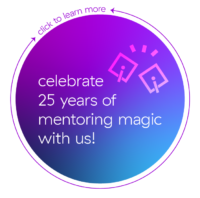iMentor continuously works to amplify the voices and experiences of people of color. For Asian American and Pacific Islander Heritage Month, we are highlighting some of the leadership stories of AAPI staff as they describe what motivates them to invest in iMentor students and pursue education equity work.
Jana L Reed is iMentor's chief operating officer. When we spoke to Jana, she shared how her identity as an Asian American woman influences her work and why she works in the education sector.
What first inspired you to get involved in education equity work and build a career in nonprofits?
I grew up in abject poverty in New Hampshire, and from my earliest memory, there was no imperative around learning at home. So while school was a place to get out of the house, I never felt connected to it. Through my friends and their parents, I learned that if I wanted to get a job and take care of myself, I needed to go to college. Then when I was in college, I got a work-study internship in the Governor’s Office during a time when education was front and center in the Governor’s priorities. It was in that setting that I learned there were a lot of people working hard to make education work for kids who grew up like me.
Through the support of mentors, I learned that education is a sector that values mission-driven problem solvers, doers and achievers. It’s a place where you can be a teacher, an accountant, an IT specialist, a nurse…you could even be an entrepreneur! I chose the entrepreneurial side of education. Education is one of the places where, with a great plan and a lot of effort, a small adjustment of the dial can lead to great outcomes for students.
How does being an Asian American professional influence your work?
There are very few Asian leaders in education: only 4.6% of school superintendents are Asian and only 2% of leaders in the nonprofit sector identify as Asian. While 68% of the nonprofit sector employees are non-white, only 10% of the sector’s leaders are people of color.
As iMentor’s Chief Operating Officer, I am very aware of the real and perceived privilege of the role, and I am also aware of how hard it is to break through to be one of only a few with the professional opportunities and experiences I have had. Every day I work hard to build organizations where people can build their professional careers while doing great things for students.
From your experience in student-facing work, what are some ways people can better support AAPI students and help them gain access to more early career opportunities?
I am loathe to generalize about students: what each person needs is unique to them, and we should all work to figure out what the young people in our lives need from us. That said, I have experienced and observed that our AAPI students are not always going to speak up and self advocate, and although AAPI students may experience privilege in some aspects of their lived experience, we must remember that racism, exceptionalism and othering affect our Asian American students.
We can support our AAPI students in all the traditional ways - by reaching out, helping with resumes and interviewing skills, and opening up connections.
We can also work really hard to build organizations that disrupt white normative culture and instead, construct something new in its place. I truly believe that courageous organizations that take on this hard work will be the best places for people to build their body of work, advance, and develop their careers. We should do this for our students, and our world.
What advice do you have for students in the iMentor program who want to build their leadership skills?
My advice to iMentor students is to remember that your mentor wants to learn from you too! In your mentor-mentee relationship, you can try out lots of different things, including discussing and exploring what leadership is and what your mentor has learned about it.
You could even flip the script and talk with your mentor about something they want to learn about from you—music, games, art, fashion or food, etc. Learning how to share ideas and information with others is an important element of leadership. Also, if your iMentor region has a Student Advisory Council, get involved, go to the meetings, participate and know that your views are important.
Lastly, next school year a lot of iMentor teams will be designing many new aspects of the iMentor program, platform technology, student and mentor experience, and this will open up a lot of opportunities for students to give feedback to iMentor. Let your program manager know if this is of interest to you!

